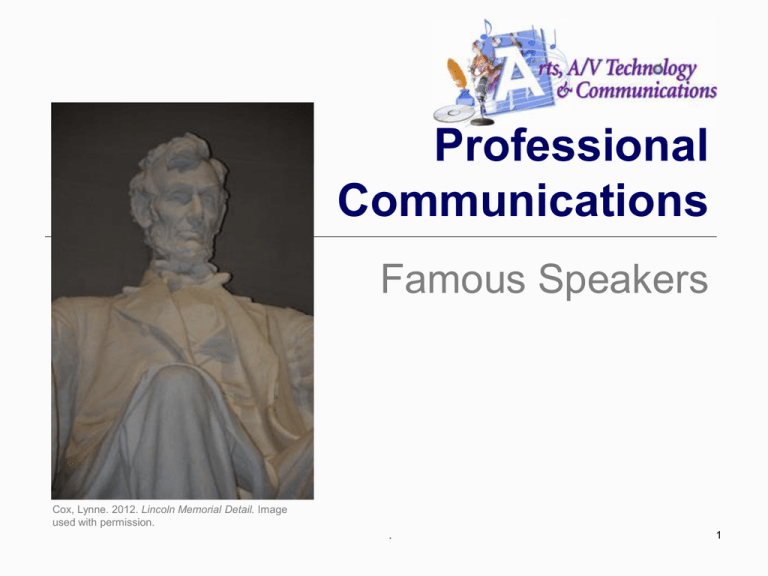
Professional
Communications
Famous Speakers
Cox, Lynne. 2012. Lincoln Memorial Detail. Image
used with permission.
.
1
Activities
Discuss reasons for studying famous
speakers
Choose two speeches
Analyze speeches
Identify imagery, techniques, and emotional
appeal
Identify speech goals
Identify the value of the speeches
Discuss value of historical speeches for today
Use the speech writer
Write and Deliver a Persuasive Speech
Copyright © Texas Education Agency, 2012. All rights reserved.
Images and other multimedia content used with permission.
2
Why Study Famous Speeches?
Historical significance
Implications
Improve your writing and
speaking skills
Cox, Lynne. 2012. Martin Luther King, Jr. Memorial
Detail. Image used with permission.
Copyright © Texas Education Agency, 2012. All rights reserved.
Images and other multimedia content used with permission.
3
Historical Significance
What specific reason
and/or audience was
the speech for?
What was the meaning
or significance of the
speech?
Cox, Lynne. 2012. Independence Hall, Signing Room of the
Declaration of Independence. Image used with permission.
Copyright © Texas Education Agency, 2012. All rights reserved.
Images and other multimedia content used with permission.
4
Improving Speech Writing
Length of the sentences and the use of
grammar (commas, semi-colons, question
marks, quotes, etc.)
Logical flow of the speech
Use of imagery and emotional appeal
Copyright © Texas Education Agency, 2012. All rights reserved.
Images and other multimedia content used with permission.
5
Goals of the Public Speaker
What do you feel was
achieved by the
speech?
What do you feel the
audience wanted in the
speech?
What rewards could be
gained from the
speech?
Copyright © Texas Education Agency, 2012. All rights reserved.
Images and other multimedia content used with permission.
6
Speech Value
Why is the speech
valuable?
What can each speech
include to improve its
value for today?
Cox, Lynne. 2012. Martin Luther King, Jr. Memorial
Speech Wall. Image used with permission.
Copyright © Texas Education Agency, 2012. All rights reserved.
Images and other multimedia content used with permission.
7
Look at Available Speech
Topics
Research
Pick a topic:
Pollution (type &
damages)
Water Conservation
Health Care – Pros or
Cons
Education – EOC
Immigration – Pros or
Cons
Cox, Lynne. 2012. John Fitzgerald Kennedy Memorial Speech
Wall. Image used with permission.
8
Process
1.
2.
Read the information about
your topic.
Place in the format.
3.
Copyright © Texas Education Agency, 2012. All rights reserved.
Images and other multimedia content used with permission.
9
PREPARING THE
PERSUASIVE SPEECH
BASIC OUTLINE
I.
Introduction
A. Attention-getter (Hook)
B. Justification (Why the audience should
care about it – what’s in it for them.)
C. Thesis (Main Idea)
D. Preview Statement (Sentence that lists
the points to be covered.)
Copyright © Texas Education Agency, 2012. All rights reserved.
Images and other multimedia content used with permission.
10
The Body of the Speech
II. Body (3 arguments strengthen a thesis).
A. Argument #1 (make it a clean & clear
sentence).
1. Cite your source – author, date,
creditionals, publication, etc.
2. Quote the Evidence with quote
marks.
3. Explain how evid. Supports arg.
B. Argument #2 & #3 do the same as #1.
.
11
The Conclusion (It’s like
a backward Introduction.)
III. The Conclusion
A. Summary (Restate in a sentence the
points covered in the body.)
B. Restate the Thesis
C. Add a Clincher or Zinger (It’s the Hook
or memorable statement at the end.)
. .
12

